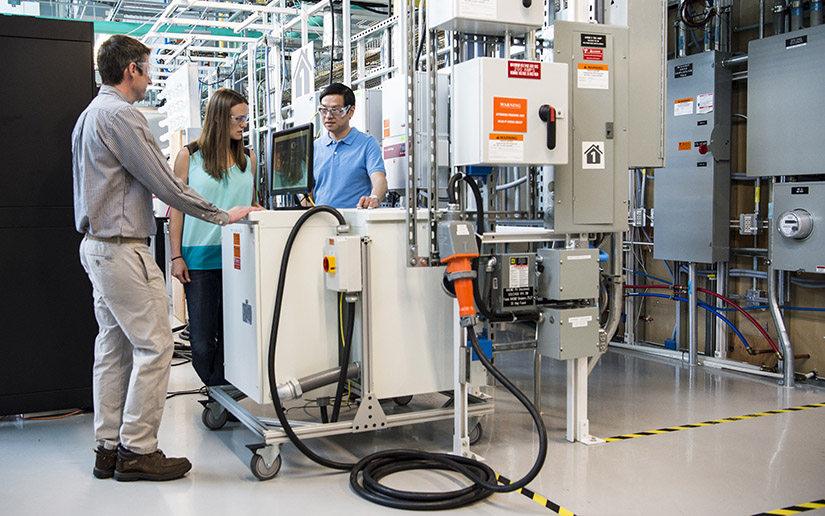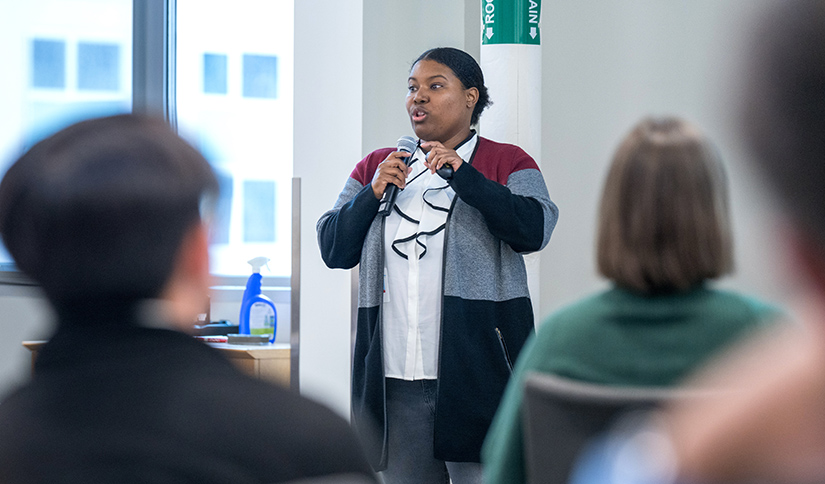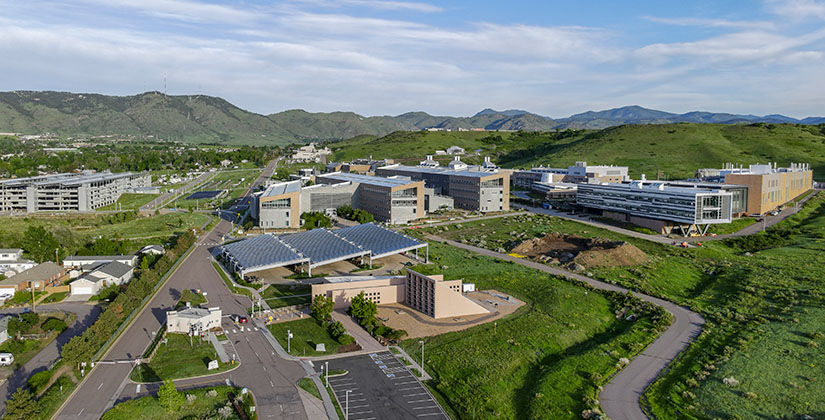How a Career in Building Science Can Shape a More Equitable Future
Opportunities for Cross-Disciplinary Expertise To Advance Buildings Research

Americans spend nearly 90% of their time indoors—at the office, out for dinner at a favorite restaurant, in school, or simply living their everyday lives at home.
But did you know that these same buildings where we live, work, and play consume roughly 40% of America's total energy use to keep occupants comfortable and productive?
Buildings researchers at the National Renewable Energy Laboratory (NREL) are committed to transforming America's homes, offices, businesses, and other buildings into more efficient, affordable, healthy, and resilient places.
And they are expanding the team to make that shift a reality.
A career in building science at NREL means rethinking the way buildings are designed and used to lessen the impact on our energy system, without sacrificing affordability, comfort, or safety. NREL is leading impactful buildings solution at all stages—from research, development, demonstration, and deployment (RDD&D)—to deliver scalable solutions for a clean energy economy.
Buildings Researchers Share Their Experience
Xin Jin
NREL senior research engineer Xin Jin works in NREL's residential buildings group and said he did not always know his path would lead to a career in buildings research but recalls there were subtle signs.

"When I was little kid, I liked building things with Brain Flakes and building blocks," Jin said.
Stemming from childhood playtime interests, Jin went on to earn a Ph.D. in mechanical engineering and found applications of his knowledge in control systems in buildings research. Since joining NREL in 2012, he has contributed to many high-impact projects in buildings research and innovations.
Jin said his favorite project so far at NREL has been development of the R&D 100 Award-winning smart-home software, foreseeTM. The software can predict future energy consumption in homes, enabling highly accurate predictions of comfort needs, energy costs, environmental impacts, and grid service availability by leveraging machine-learning algorithms, advanced data analytics, and physics-based modeling and simulations to derive data-driven appliance models and usage patterns.
"The software can provide demand response to the utility and help the homeowner save energy and utility bills, and also make their home more resilient during an outage," Jin explained.
Jin and his team have taken foresee to the affordable housing sector, expanding the benefits of home automation technology, such as cost savings and convenience, to low-income residents. As an example, through a partnership with Holy Cross Energy in Colorado, NREL's foresee technology was used in homes at Basalt Vista, an affordable housing community near the upscale resort town of Aspen, to house the community's teachers and county workers.
NREL places energy equity at the center of its mission-driven work, including in buildings research and deployment. Jin said partnerships and collaboration are essential to delivering more affordable housing to ensure an equitable and inclusive future of the buildings industry.
"There's a housing crisis everywhere in the U.S. right now, and I think the best solution is to find ways to build homes in a more inexpensive way and make them more efficient so we can provide more housing to people who need it," Jin said.
Ardelia Clarke
Ardelia Clarke is an NREL modeling engineer who has carved out a unique career path as a nuclear physicist to an expert in equitable buildings design and modeling at NREL.

With experience in physics modeling and complex data analysis, Clarke sought out NREL as a place she could transfer her skills into the expanding field of renewable energy and support the emerging needs for big data and modern modeling solutions.
"My passion is helping people, but in my own nerding-out way," Clarke said. "Leveraging a systematic approach gained from my physics background, my research applies a tailored, holistic approach to truly learn about people's needs and offset existing injustices to develop equitable building technology solutions."
Clarke was selected in the 2016 GEM Fellowship Program, which aims to increase the participation of underrepresented groups at the master's and doctoral levels in engineering and science. Since joining NREL in 2019, Clarke has focused much of her work on equitable building design and deployment for the benefit of underserved communities.
Clarke said her favorite project so far has been the publication Centering Energy and Environmental Justice in the Buildings Energy Sector, which catalyzed additional work in equity-centric buildings solutions for underserved communities.
"It allowed me to take a deep dive at understanding how the building energy sector intersects with environmental justice," Clarke said.
This approach ensures community members are engaged and involved as experts in every step of the project, allowing NREL to learn from lived experiences of local community experts. This allows NREL researchers to incorporate additional equity considerations and make adjustments in the modeling process to account for actual experiences and needs.
"Doing this ensures the way in which we're quantifying [data] and making decisions using modeling outcomes resonates not only from the technical side but also from the community's perspective to meet their needs."
Clarke has contributed to many equitable, community-centric energy projects at NREL, including a collaboration with the Black Farmers' Collaborative where NREL supported planning to incorporate solar panels at Florida farms and churches.
Join NREL's Buildings Researchers
NREL is transforming energy through integrated building science by leveraging world-class facilities, unique partnerships, and integrated research capabilities. NREL's buildings research is focused across five distinct yet integrated areas to accelerate market transformation, including energy modeling and analysis; technology innovation; validation, verification, and de-risking; workforce development; and technical assistance.

Buildings researchers at NREL comes from a wide array of science-based expertise and experience sectors, bringing diverse perspectives and expertise, to push technology and innovation to the next level.
To solve the building decarbonization challenge, people of all backgrounds, disciplines, and perspectives are needed in order to equitably reach a 100% clean energy economy.
"There is nobody who's not needed in this kind of transition," Clarke said. "We need people of every walk of life to be included to help develop and deliver tailored and equitable solutions."
Jin echoed this experience, recognizing that his unique skill set and experience in system automation and control transferred perfectly into his role at NREL.
"I didn't have much background in buildings, so, when I think about building control problems, it's more like thinking outside the box," Jin explained. "I hope the next generation of buildings scientists will have an open mind and think outside the box to help find new solutions and leverage emerging technology, like artificial intelligence, to help solve building decarbonization challenges."
Clarke encourages anyone intrigued by renewable energy with a passion to learn something new to consider a career in the buildings industry.
"Thinking that this kind of work is not part of your skill set is natural but, by taking that leap of faith, you might find the best outcomes occur when you experience and challenge the unknown."
Ready to make a difference through NREL's integrated building science research? Explore careers at NREL.

